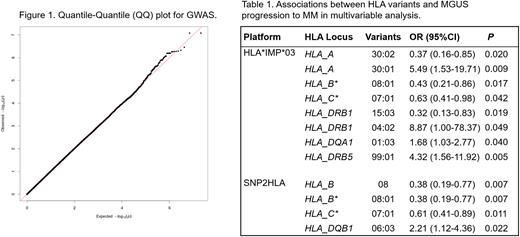Abstract
Background: Multiple Myeloma (MM), a neoplasm of terminally differentiated plasma cells that produce a monoclonal immunoglobulin, represents 10% of hematologic malignancies. Virtually all MM arises from monoclonal gammopathy of undetermined significance (MGUS), an asymptomatic premalignant phase, at a rate of progression of about 1% annually. However, the risk of progression is not uniform as some individuals with MGUS could have progression rates as high as 58% in 20 years. Novel predictive markers are critically needed to accurately identify MGUS patients at high-risk of malignant transformation, so that early intervention can be implemented to prevent end-organ damage associated with frank myeloma. Genome-wide association studies (GWAS) have repeatedly identified loci at the major histocompatibility complex (MHC) that are associated with the risk of many cancers including MM. However, the impact of specific MHC loci on the MGUS-to-MM progression risk has not been elucidated.
Methods: We used the Illumina Infinium Global Screening Array to scan the buffy coat samples of 259 MGUS and 654 MM patients enrolled from the Medical College of Wisconsin (MCW) Tissue Bank. All MGUS and MM patients have been chart reviewed and confirmed diagnosis. After a standard quality control (QC), 249 MGUS and 619 MM patients with 11,882 genotyped single nucleotide polymorphisms (SNPs) in the MHC region (20 to 40 mb at chromosome 6) were used for analysis. The SNP2HLA v1.0.3 software and HLA*IMP:03 were applied to impute classical human leukocyte antigen (HLA) alleles at a four-digit resolution based on SNP genotyping. SNP2HLA uses Beagle to impute all missing SNPs, classical HLA alleles, and amino acid polymorphisms to the HapMap reference panel. HLA*IMP:03 uses the Michigan Imputation Server to impute phased haplotypes to a multi-ethnic panel of 10,561 individuals with SNP genotype data and lab-based typing of alleles at 11 HLA genes. A post-imputation QC was conducted to remove variants with low imputation quality score (R2 < 0.3). Logistic regression analysis was performed using PLINK, a whole genome association analysis toolset, which adjusted for age, race, sex, and top principal components.
Results: As evidenced by the quantile-quantile (QQ) plot (Figure 1), there was no evidence for hidden substructure or cryptic relatedness in the GWAS (λ=1.02). The final set of imputed variants from both tools used in association analysis were of high quality (R2 ≥0.9). Although we did not observe any HLA variants showing associations with the progression of MGUS to MM at Bonferroni adjusted significance level for SNP2HLA (P = 0.05/5865 = 8.53 × 10-6) and for HLA*IMP:03 (P = 0.05/215 = 2.33 × 10-4), we found 4 classical HLA alleles and 30 HLA Amino Acids were associated with MGUS progression at a P-value of < 0.05 via association analysis with SNP2HLA. Association analysis for HLA*IMP:03 imputation data identified 8 classical HLA alleles were associated with MGUS progression at P value < 0.05. Among them, two classical HLA alleles were identified in both tools, they are HLA_B*08:01 (odds ratio, OR=0.38, 95% confidence interval, CI =0.19-0.77 and OR=0.43, 95% CI=0.21-0.86 for SNP2HLA and HLA*IMP:03, respectively) and HLA_C*07:01 (OR=0.61, 95% CI=0.41-0.89 and OR=0.63, 95% CI=0.41-0.98 for SNP2HLA and HLA*IMP:03, respectively) (Table 1).
Conclusions: These results implicate that HLA alleles may contribute to the progression of MGUS to MM. Further studies are needed to validate our findings with larger sample sizes and explore the biological mechanisms.
Disclosures
Dhakal:Janssen: Consultancy, Honoraria, Research Funding, Speakers Bureau; Amgen: Consultancy, Honoraria; GlaxoSmithKline: Consultancy, Honoraria, Research Funding; Sanofi: Consultancy, Honoraria, Research Funding, Speakers Bureau; Karyopharm Therapeutics: Honoraria, Speakers Bureau; BMS: Honoraria, Research Funding; Natera: Consultancy; Arcellx: Research Funding; Carsgen: Research Funding; Cartesian: Research Funding; Fate: Research Funding; Takeda: Honoraria; Pfizer: Membership on an entity's Board of Directors or advisory committees; AbbVie: Membership on an entity's Board of Directors or advisory committees; Genentech: Membership on an entity's Board of Directors or advisory committees. Hari:Novartis: Honoraria; Karyopharm: Consultancy, Honoraria; Takeda: Consultancy, Honoraria; Incyte: Honoraria; Amgen: Consultancy, Honoraria; Sanofi: Consultancy, Honoraria; Janssen: Consultancy, Honoraria; GlaxoSmithKline: Honoraria; Kite: Consultancy, Honoraria; BMS: Consultancy, Honoraria, Research Funding; Spectrum Pharmaceuticals: Research Funding; AbbVie: Honoraria; Iovance: Current Employment; Pharmacyclics: Consultancy; Millennium: Research Funding.
Author notes
Asterisk with author names denotes non-ASH members.


